Understanding the Wedding Venue Business
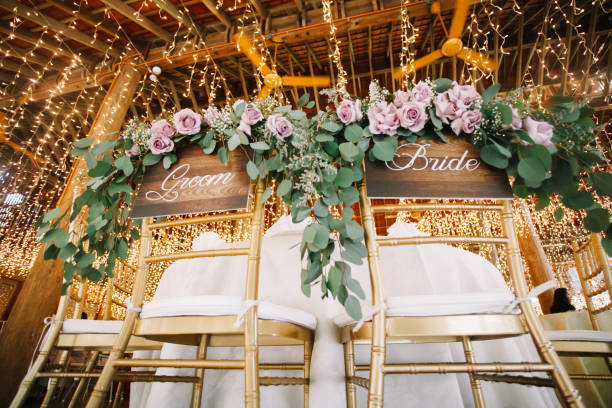
Knowing everything there is to know about running a successful wedding venue business is key, so let’s get started and explore what you need to consider before taking that first step into the world of weddings!
Wedding Venues: A Cornerstone of the Wedding Industry
As a wedding venue business owner, you have the unique opportunity to be part of one of the most special days in people’s lives. A wedding venue provides a space for couples to celebrate their love and make memories that will last a lifetime.
It is no surprise, then, that having the right wedding venue is seen as an integral part of planning any couple’s perfect day. The appeal of owning your own successful wedding venue business can be immense—connecting with soon-to-be-married couples and helping them fulfil their dream vision takes dedication and hard work but also leaves scope for creativity! The average wedding size consists of around 150 guests, on average spending anywhere from $800-$3,000 per person depending on location, night stay duration, and vendors used by every couple while achieving what they want from their big day.
Whether it’s barn weddings or beach getaways for destination weddings, it’s essential to conduct research into potential markets locally to best understand customer preferences before launching your own successful Venue Business.
The Appeal of Owning a Successful Wedding Venue Business
Owning a wedding venue can be an immensely profitable and rewarding venture. Couples are often willing to spend large amounts of money on their special day, making the wedding industry one of the most lucrative sectors around.
This makes running a successful business in this area very appealing as there is potential for high profits. Additionally, managing a wedding venue allows someone to work closely with those in the event planning and wedding industries and gives them the opportunity to work with couples directly throughout their journey to happily-ever-after’s! Whether you got your start by renting or buying a new facility, transforming an outbuilding into a barn venue or working through government zoning laws – owning a successful business within this sector provides flexibility and potential for long-term gains, all while entering an exciting field-packed with passionate professionals.
Average Wedding Size
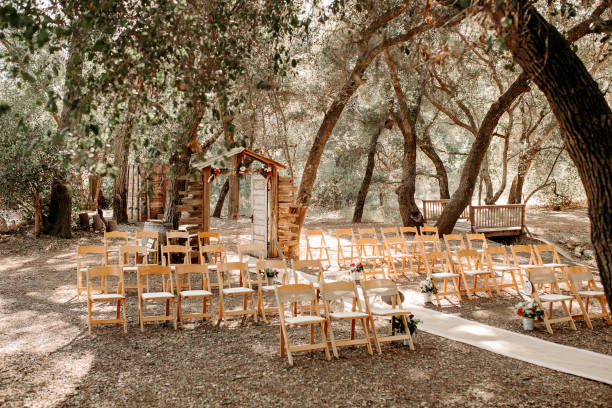
When planning a wedding, the size of your ceremony and reception are often just as important as the location. The average wedding size in the US is getting smaller, with the most popular guest count being 140 or fewer.
This means that couples must choose their venues carefully to ensure it has enough room to accommodate all of their guests comfortably. Additionally, catering costs will be lower if you have fewer people attending your event.
Research the Event Venue Market in Your Area
Starting a wedding venue business is an exciting adventure, but there are many steps and considerations that you must address before opening your doors. One of the most important decisions to make when beginning your wedding venue journey is researching the event venue market in your area.
You’ll need to understand how much demand there is for wedding venues and what types of events customers may be interested in hosting at your business so you can plan appropriately.
Additionally, assessing potential competition will help inform any strategic decisions regarding pricing or service offerings you provide at your venue. Finally, it’s also important to examine whether local zoning laws allow for the size and type of events you want to host. Without this information, it could be difficult or impossible to achieve success with your venture!
Planning Your Wedding Venue Business

Before launching your wedding venue business, it’s important to understand the steps you need to take and how much capital is needed so that you can be a successful wedding venue owner.
How Much Capital Do I Need to Start a Wedding Venue Business?
Starting a wedding venue business can be an incredibly rewarding experience, but it is also a major investment. The capital required to start this type of business will vary depending on the size and scope of your plans.
Generally, you should expect to need anywhere from $750,000 to $3 million to get your wedding venue up and running. Factors such as lease or purchase price for the location property, renovation costs, insurance requirements, staffing expenses and marketing fees all play into the cost equation.
Additionally, purchasing equipment like tables and chairs plus decorations for the wedding ceremony space, hall or reception areas may add thousands more in expense.
Create a Wedding Venue Business Plan
Creating a wedding venue business plan is an essential step to success for any new wedding venue owners or owner. A business plan helps you know your goals and strategies before starting a wedding venue business, as well as keep track of progress and ensure the financial success of your venture.
- Write down your vision for the venue – Be clear about what kind of experience or service the customer can expect.
- Identify target customers and competitors – Understand who your target customers are and who you’re competing within the wedding industry.
- Research local zoning laws – Make sure you’re not inadvertently breaking any regulations while setting up your business.
- Calculate startup costs – Get an accurate estimate of how much money you need to get the ball rolling in terms of renting or buying space, equipment rental, etc.
- Develop a financial model – Create revenue models based on historical data in order to determine the per cent markup on events booked at the venue for maximum profitability.
- Draft an operating budget – Set aside money for staffing costs, acquisitions, marketing expenses, etc.
- Find sources of capital – Look into investors or bank loans for help with upfront costs if they are needed.
- Get legal advice – Consult experienced professionals with familiarity in legal matters related to running a wedding venue business such as insurance coverage.
- Hire staff and vendors – Bring in staff members (e.g., event coordinators) and vendors (e.g., catering) necessary to run things smoothly.
Select an Event Management System
An event management system (EMS) is an important tool when starting a wedding venue business. It streamlines and automates tasks such as booking, scheduling, and coordinating events to improve efficiency and increase productivity.
This system helps in planning and organizing various aspects of your business from start to finish. It can track bookings, availability, and payments – all helping you get organized for each unique event in an effortless manner.
EMS also enables you to easily assign tasks among team members, which makes it even easier to manage larger groups while keeping everyone informed about upcoming projects or changes happening with existing ones.
Selecting and Preparing Your Venue
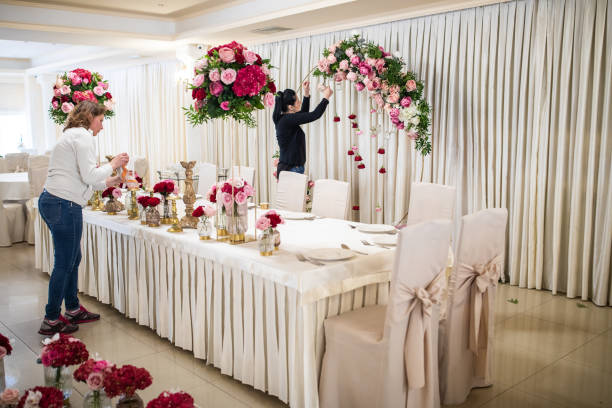
Before you can open up your wedding venue business, you need to select a location and get it prepped for opening day. Consider the size, accessibility and local zoning laws of the area when selecting a spot for your event space.
What Are the Most Important Factors to Consider When Selecting a Location for a Wedding Venue?
Selecting a location for your wedding venue can be an intimidating task. However, understanding the most important factors to consider when choosing a great wedding venue site can make it a much less daunting process.
Firstly, please pay attention to the size of the venue; it should comfortably be able to accommodate your guest list without feeling cramped or too big and empty. Secondly, the aesthetic of the venue is very important and should match what you have envisioned for your special day – from rustic barns to modern chapels, take time to find something that you absolutely love.
In addition, remember budget when looking into venues, concerning cost and deposit fees, as well as potential add-ons such as catering services and decorations packages, which may come included in some site’s fees upfront.
Also, keep in mind parking availability, especially if it’s located far away from city centers or guests are coming from out of town – they’ll need somewhere convenient yet secure enough for cars being left overnight.
Last but not least, easy accessibility is key! The location should be close enough so that guests won’t feel overburdened by transportation times, plus offer nearby accommodation options just in case someone needs a place to stay last minute.
Renting or Buying a New Wedding Venue
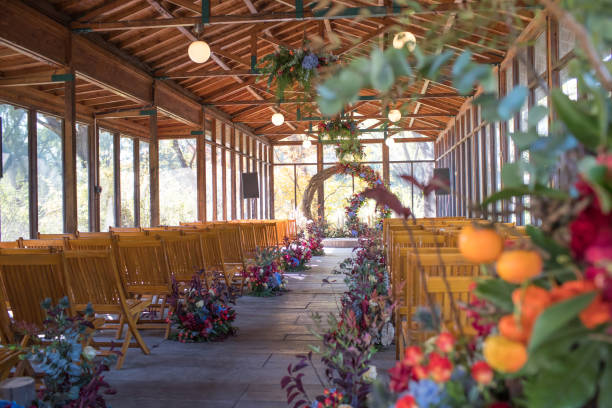
When you’re planning to open a wedding venue, one of the first important decisions is whether to rent or buy your new space. Location is essential for a successful wedding business – it needs to be accessible with enough parking and would ideally suit the style of weddings that you’ll host.
Additionally, you should consider how much renovation will need to be done on the property before it can be ready for events. If you don’t have access to funds upfront, renting might make more financial sense since going through with a purchase requires an initial down payment and ongoing mortgage payments during months when there is less demand for your services.
On the other hand, buying could have potential long-term benefits if your business succeeds; as revenues increase each month, profits become higher than rental costs after a while.
How Much Space Do You Need for a Wedding Venue?
When it comes to hosting a wedding, having the right amount of space is key. On average, you’ll need approximately 15 to 17 square feet of space per person for a capacity of up to 300 people.
This means that if your wedding party includes 150 guests, you’d need around 2,250—3,000 square feet total in order to host them adequately. Of course, the actual amount may vary depending on the specifics of your venue; some weddings may require less or more room than others due to differences in layouts and amenities.
For example, an outdoor ceremony area might be smaller due to natural scenery taking up some of the space, while a larger ballroom requiring furniture and decorations could need far more floor space.
Parking Space Requirements for a Wedding Venue
When planning a wedding venue, it’s important to consider the number of people who will be attending your events and how many parking spots you’ll need for them. The Lifeway builders suggest that there should be one parking space for every two people coming to an event – so if you’re expecting 100 guests, you would need 50 parking spaces.
Having enough adequate parking available is key – not just for convenience but also for safety. If a guest can’t find anywhere to park safely, they may have to park far away, which could lead them to be late or even miss out on the special moments altogether! It’s essential to make sure there are enough spaces available at your wedding venue location so that everyone has easy access when arriving and departing from the special day in celebration.
Can I Turn an Outbuilding into a Barn Wedding Venue?
Yes, it is possible to convert an outbuilding into a barn wedding venue! To do so successfully and legally, there are a few steps and considerations that need to be taken. First of all, you will need to check with the local zoning laws in your area & make sure the outbuilding is suitable for conversion.
Depending on where you are located, certain renovations or prep work might also need to be undertaken before the space can safely accommodate guests for a wedding ceremony or reception.
This may include things like adding additional lighting, replacing any old fixtures, painting walls or floors, etc. Once everything meets legal requirements for safety and aesthetics, then you’ll be able to open your barn wedding venue and welcome newlyweds-to-be!
Understanding Costs and Profits
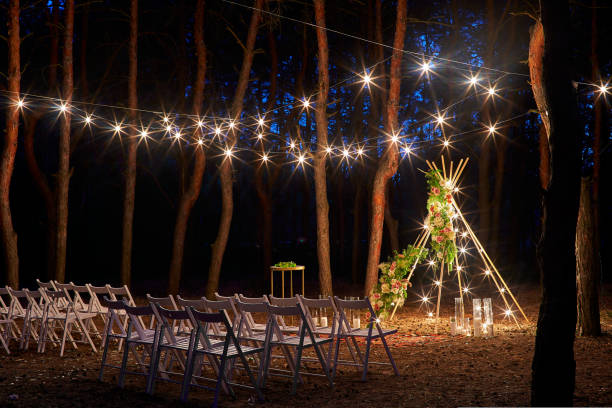
It is important to understand the costs and profits of owning a wedding venue business before I make my investment, so it’s essential to research the cost of building and operating a wedding venue industry, as well as its potential profit margin.
Look at the Cost of Building a Wedding Venue
Building a wedding venue is an exciting venture. However, many people need to realize just how costly such an endeavor can be. The average cost of renovating and remodeling a wedding venue space in the US can range from $20,000 to $100,000 or more.
Building a wedding venue from scratch can cost around three times as much, between $750,000 and even up to $1 million! Despite the huge start-up costs involved, it’s possible for wedding venues to generate anywhere from $10,000 – on the low end – all the way up to several hundred thousand dollars in revenue each year.
So when starting your own business, my advice is always to do your research first before taking the plunge into owning this type of venue – make sure you understand what kind of start-up capital you’ll need and where potential sources of income may come from so that you’re able to set yourself up for success!
How Much Does It Cost to Start a Wedding Venue Business?
Starting a wedding venue business involves assessing your finances and determining the right location to make sure you put together an amazing event for every couple who book with you.
The amount of money it takes to start this type of business varies tremendously, as you can be looking at anything from $400,000 up if building from the ground up or renovating an existing space.
On average, a renovation & remodeling project would cost between $20,000 and $100,000, whereas building from scratch should range from $750,000 to even over a million dollars! It’s totally worth it when everything is finished, though; venues typically charge anywhere between the standard price range of 1000-10 000 USD for both indoor and outdoor weddings, so in time, all these expenses could pay off.
Cost to Build a Barn Wedding Venue
Building a barn wedding venue is a big undertaking but also one of the most unique and magical experiences you can offer your clients. But before jumping into starting the process, it’s important to research the cost options available.
The cost to build a barn wedding venue varies depending on several factors such as size and design of the space, materials used in construction or renovation, local zoning laws that dictate where these spaces must be located—and what else may be required (e.g., permits for any building changes) etc. Generally speaking, barn find wedding venues alone may range from $750,000 to $1 million.
A new venue for wedding planners typically starts at around $400-500K range, including developing all amenities that are necessary for hosting weddings both indoors and outdoors with custom touches like furniture pieces or proper lighting fixtures needed for successful events.
Wedding Venue Profit Margin
A wedding venue’s profit margin is the difference between what it costs to operate the business and how much money it generates. When evaluating a wedding venue business, the venue owners typically look at its profit margin to see if they are making a decent return on their investment.
Generally speaking, the average Wedding Venue Profit Margin ranges from 30-50%. It’s usually more profitable for smaller venues with lower overhead, such as barns and houses, while grand ballrooms tend to have higher overhead and generate lower profits.
To get an idea of potential income, small venues can make anywhere from $10,000 to $50,000 per year (or about $2140 per event), while larger ones generate several hundred thousand dollars annually.
Setting Up Your Wedding Venue Business

From registering a catchy name to applying for necessary licenses and permits, there are many steps involved in setting up your wedding venue business. Read this blog post to get an overview of how you can start your own wedding venue business!
Create and Register a Catchy Wedding Venue Business Name
Choosing a memorable and resonant name is the cornerstone of establishing your wedding venue business. When selecting a name, it should reflect the desired brand and focus of your wedding venue – this helps build a strong foundation for clients’ sense of trust in you as an owner.
Not only does having a catchy name help with recognition, but it can also make your business more appealing to potential customers. Registering your business will ensure that the legal ownership is well-defined and protected, too; this will also make branding much easier! If you get creative with naming or throw in puns here and there, then these little touches can add life into what could have been some stale content! Having the perfect wedding venue business name that fits all these criteria is absolutely key for capturing interest from both brides-to-be and other industry professionals alike.
Apply for Wedding Venue Business Licenses and Permits
As a wedding venue owner, it is absolutely essential to apply for all the necessary licensing and permits to legally operate your business. Each local municipality and state have different requirements regarding business operations licenses for wedding venues. The specific licenses and permits needed may vary based on the type of wedding venue business that you are setting up. For example, New York requires special event licenses and certifications, liquor licensing, third-party insurance requirements, and more.
- Research the Business Requirements – Research your city’s local zoning laws, along with any special regulations and requirements related to running an event space in your area. Ensure you understand what types of businesses can operate within your chosen venue location (such as whether or not alcohol sale is permitted).
- Secure Your Business Finances Separate – Make sure you set up a separate bank account and credit card for your wedding venue business so that your personal finances do not mix with business expenses.
- Obtain Necessary Zoning Permits – After confirmation that operating a wedding venue in your selected location is possible, contact your local town hall office or small business office from where additional details about obtaining zoning permits can be obtained. You may need to submit plans of the property before obtaining permission to operate a wedding reception facility from the property owners or municipal authorities.
Set Up a Reliable Network of Wedding Vendors
Starting a wedding venue business means setting up a reliable network of wedding vendors in order to be successful. Not only do you need talented vendors, but it is important that they understand your vision and align with the goals of your business. That is why building relationships with industry professionals and networking effectively are so important when starting a new venture.
- Research potential partners ranging from bakers to florists who will help make your venue stand out compared to other businesses in the area
- Meet face-to-face or virtually to build relationships with these professionals
- Look into their portfolios and reviews from past clients prior to committing
Marketing Your Wedding Venue Business
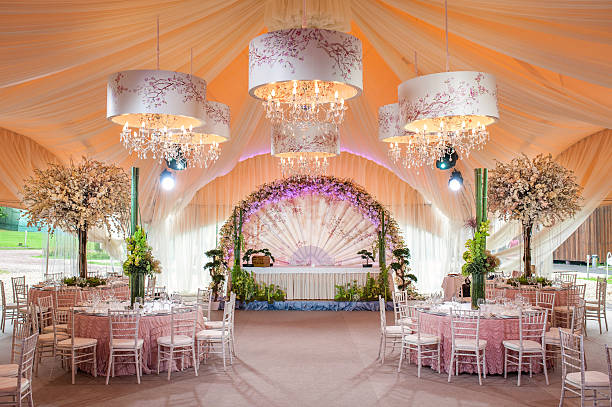
Utilize various marketing strategies to make your wedding venue business stand out from the competition. Consider displaying real weddings around your venue as well as carrying out referral-based campaigns and promoting your business line with the help of wedding professionals in the local area.
Launch Your Venue Marketing Strategy
Launching a powerful venue marketing strategy is essential for success in the wedding industry. As a wedding venue business owner, here are some steps you can follow to achieve your goals:
- Define your objectives – The first step to launching your venue marketing plan is to set clear objectives and develop key performance metrics to measure progress over time. Think about the type of weddings you want to host, the target audience, pricing models and other important details.
- Identify Your Target Audience – It’s important to understand which groups you are targeting through your venue marketing activities, so narrow down an audience profile that best fits your services and market accordingly.
- Research Competitors – Knowing how competing venues market their services will help you refine your approach and stand out from the competition. Do an online search on wedding planning sites, ask family and friends or contact other professional venues in town for feedback.
- Focus on Content Marketing – Content marketing can be leveraged in several ways, including blog posts on wedding trends, social media posts featuring real weddings at your location and print materials such as pamphlets or flyers that highlight the special features of your location
- Utilize Social Media Platforms – Leveraging social media channels like Facebook, Instagram, and Twitter is a strong way to reach more people and build relationships with potential clients quickly. Create content like videos, photos or short stories that showcase real events held at your event house or post customer testimonials about previous events they hosted at the space
Market the Venue for Destination Weddings
As a wedding venue owner, it’s important to market your venue for destination weddings. Offering couples the chance to get married in beautiful and unique locations can be very appealing and memorable.
Destination weddings give you and the couple a chance to create lifelong memories with friends and family from out of town while providing stunning backdrops for their wedding ceremonies or receptions.
Additionally, they present an opportunity for your business to gain attention and increase profits by marketing the perfect backdrop for big life events.
You can start promoting destination weddings by leveraging popular social media platforms such as Instagram that couples often visit when researching venues. Moreover, partnering with local vendors is also beneficial since cross-promotion allows them both to reach greater audiences together than either could alone.
